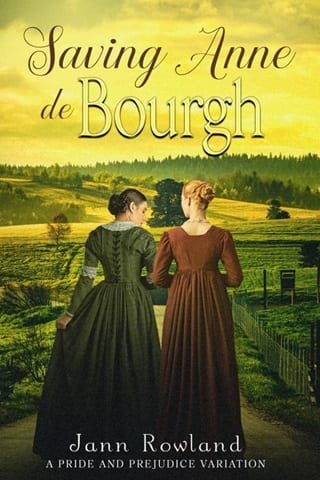Chapter VI
U ncertain her eyes were not playing tricks on her, Elizabeth stared at the shadowed form of the woman in the coach. It appeared to be Anne de Bourgh without a doubt, a conviction that firmed when Elizabeth moved a little closer. The woman sat in the carriage appearing ill at ease, looking this way and that, though she still had not caught sight of Elizabeth watching her. Dressed in the sort of clothing she had worn at Rosings Park, heavy fabrics draped over her thin frame, the gown, while appearing impressive, must be sweltering in the late June warmth.
Now Elizabeth had a dilemma, and the implications of seeing her here were not at all pleasant. Elizabeth had never had much to do with Miss de Bourgh, had exchanged only the barest of civilities demanded by politeness; Miss de Bourgh had never seemed to wish for more than this, though whether that was because of the sense of superiority that ruled her mother, or some other reason Elizabeth could not say. The Anne de Bourgh she had met in Kent would surely not welcome any intrusion from Miss Elizabeth Bennet of an insignificant estate in Hertfordshire.
Yet could she walk away without attempting to discover what was happening? If Lydia's insistence that she had seen Mr. Wickham had been at all correct, could his appearance and that of Miss de Bourgh be a coincidence? What other reason could there be for Miss de Bourgh's presence, especially in a hired carriage of all things, with her mother nowhere nearby? If Miss de Bourgh was here with Mr. Wickham, that suggested nefarious deeds—potentially life-altering on her part. Could she walk away without even attempting to discover the true situation and acting to rescue her from the libertine's clutches?
At that moment, Miss de Bourgh turned her head, and she caught sight of Elizabeth, as evidenced by the sudden surprise on her pale features. This had the fortunate effect of deciding Elizabeth's course, for she could not walk away now when to do so was not only rude but might come with heavy consequences. Her path decided, Elizabeth stepped forward, nodding her greeting.
"Miss de Bourgh," said she, stepping forward and offering a shallow curtsey. "It is a surprise to see you here near my home."
"Miss Elizabeth," said the woman.
Elizabeth waited for her to speak again, and when she detected that complete lack of intention to converse, moved to break the silence that had again sprung up between them. "How do you do? And how is your lady mother?"
"I am well," said Miss de Bourgh. That was all she meant to say, for she closed her mouth firmly. Then, however, she seemed to think better of it, offering a curt: "Mama is well, so far as I know."
"Is she nearby?" asked Elizabeth, feigning ignorance of the situation. "I should like to greet her if she is."
"My mother is at Rosings," was Miss de Bourgh's curt reply.
"Is she?" asked Elizabeth with a frown she did not need to affect. "That is quite confusing, Miss de Bourgh, for I had thought you traveled with her. Are you traveling alone? Perhaps to your uncle or your cousin's estate?"
"I am not alone."
Again, Elizabeth experienced the frustration of her taciturnity, for it seemed she was determined to require Elizabeth to work for every morsel that passed her lips.
"Then you travel with a trusted retainer?"
This appeared to pierce her reticence, for she turned an open glare on Elizabeth. "I cannot see why it is any business of yours, Miss Elizabeth."
"No, I suppose it is not," said Elizabeth. "Yet, I cannot but wonder at your appearance in all this state, given what I know of your relationship with your mother. If I appear to be prying, I apologize, for I do not mean you to take my curiosity in such a manner. However, I am concerned, as your appearance is worrying."
Miss de Bourgh regarded her for several long moments unspeaking, and Elizabeth thought she might order her away. What she could do if she did so Elizabeth could not say, for she had no right to attempt to physically detain her, to say nothing of what Wickham would say when he returned. Her evasiveness Elizabeth now took to mean Miss de Bourgh was involved with Mr. Wickham, for it was more than her usual reserve. Should she speak of what Mr. Darcy had told her about the libertine?
"I understand," said the woman, her voice nearly a whisper. "If I am truthful, I wonder what I am doing here myself."
More than she had expected to hear, relief settled on Elizabeth, for she suspected she needed only a little more coaxing to induce her to be explicit. Donning an encouraging smile, Elizabeth edged in a little closer, taking hold of the open door, nodding with encouragement.
"If you would like, I am willing to listen and provide you with my opinion."
Though Miss de Bourgh regarded her for several long moments, Elizabeth thought there was no doubt of her capitulation.
"The reason I am here," said Miss de Bourgh at length, "is because I am eloping with a Mr. George Wickham. Mr. Wickham thought it best to throw off pursuit by going through this hamlet, and I understand he has some acquaintances here. He means to call in a few favors."
Again, feeling no need to feign alarm, Elizabeth stepped forward and entered the carriage closing the door behind her. Mr. Wickham had not appeared, and the driver was nowhere to be found, yet Elizabeth did not fancy anyone overhearing what she needed to convey to her companion.
"That is shocking, Miss de Bourgh. I hope you do not think I am officious if I advise you, in the strongest terms possible, to think twice of such a mad plan as this."
The woman regarded her, head tilted slightly to one side. "Please explain."
"Mr. Wickham is no stranger to me, Miss de Bourgh," said Elizabeth. "Until recently, he was a member of the regiment stationed in Meryton."
"This much he informed me," replied Miss de Bourgh, "though he said nothing of your presence."
"No, I cannot imagine it was anything to him," said Elizabeth. "I shall not sport with your impatience by relating anything of his behavior here, for it is not germane to the subject at hand. My disquiet, beyond the impropriety of such elopements, concerns what I know of Mr. Wickham's character. He is not a good man, and for that, I offer the testimony of your cousin, Mr. Darcy."
Miss de Bourgh watched her for a moment, then offered a slow nod. "Darcy has not been explicit, but he has commented on Mr. Wickham several times over the years. Fitzwilliam quite despises him, or so I understand."
"And with good reason," averred Elizabeth.
"What do you know on the subject?" demanded Miss de Bourgh.
"Only what Mr. Darcy informed me himself," said Elizabeth. "Mr. Wickham games and accumulates debts and has a less than savory history with ladies. He did not speak openly of such matters, but what he inferred was enough to put me on my guard."
"Why would he share such things with you, of all people?"
"Presumably because I live in a neighborhood Mr. Wickham called home," replied Elizabeth. Uncertain how she would take the news of Mr. Darcy's proposal in Hertfordshire parsonage, Elizabeth could not speak of it, though it appeared Miss de Bourgh had no interest in Mr. Darcy as a marriage partner, despite her mother's raptures on the subject.
Miss de Bourgh seemed to consider that. "Then he wished to put you on your guard."
"Yes," replied Elizabeth. "As you might recall, I am the second of five sisters—my family more than most others might be a target for his depredations."
A low nod comprised Miss de Bourgh's response though she gave no other. Elizabeth waited for her to reply, knowing that time might be of the essence, for Mr. Wickham might return at any moment. To speak quickly and without due thought, however, might lead to a stubborn refusal to listen. Though knowing the man might return at any moment, Elizabeth forced herself to patience, hoping Miss de Bourgh would see sense.
"I... do not know what to believe," said Miss de Bourgh at length. "Mr. Wickham has informed me of his falling out with my cousin. Given Darcy's character, his account of what happened between them is not unbelievable."
"Do you speak of the living Mr. Darcy's father referenced in his will?"
Miss de Bourgh replied with a wry smile. "I see Darcy's account to you was nothing less than thorough."
"It was," said Elizabeth. "Take care for what Mr. Wickham says, for Mr. Darcy's father left the living conditionally, and when Mr. Wickham refused it, Mr. Darcy compensated him accordingly."
Again, Miss de Bourgh regarded Elizabeth, her head cocked to the side. "Mr. Wickham said nothing of this?"
"No doubt to deceive," said Elizabeth, not scrupling to hide the disgust she felt for the absent libertine. "Mr. Darcy gave him four thousand pounds, a one thousand bequest, and three thousand in lieu of the living."
"That is... excessive," said Miss de Bourgh, her shock reflected on her features.
"According to Mr. Darcy, Mr. Wickham depleted it entirely in less than two years."
Miss de Bourgh nodded, appearing distracted anew. Elizabeth's nerves, already taut with strain, heightened even more at the sound of footsteps, though a glance outside the carriage revealed it to be nothing more than a man of the town passing by. If she did not convince Miss de Bourgh soon, Mr. Wickham would return, and she would lose all possibility of it. There was only one more account that might sway her, and Elizabeth determined to use it at once.
"This is not the first time Mr. Wickham has attempted this with a member of your family."
"Oh?" asked she, shocked by Elizabeth's sudden statement. "What do you mean?"
"Mr. Darcy informed me of this in the strictest confidence," said Elizabeth. "When his sister was staying by the sea last summer, Mr. Wickham went there attempting to convince her to elope with him. Mr. Darcy arrived and foiled the plot before he could damage her, but I understand it affects her to this day."
"I heard nothing of this," said Miss de Bourgh, appearing weak at the very notion.
"The reason for Mr. Darcy's communication to me, of all people, is not relevant." Elizabeth peered at her, anxiety at the prospect of Mr. Wickham's return shading her heart with foreboding. "I have no reason to tell you falsehoods, for I only wish to assist. Should Mr. Wickham return and find us still here, I fear you will lose any chance of escape. Please, Miss de Bourgh —let us depart at once. If you marry him, you will ruin your life."
Finally, it appeared Miss de Bourgh believed her, for she regarded Elizabeth, her countenance even paler than was her wont. "But where shall I go? I am friendless here."
"Not friendless," said Elizabeth, gripping her hand tightly. "We should go to my home. We have some sturdy lads at my father's estate who will protect you. But we must escape so we can reach it without his interference."
A nod comprised her response, with a softly spoken: "What should we do?"
"Come," said Elizabeth, keeping hold of Miss de Bourgh's hand.
With her other hand, she grasped the carriage door and opened it, stepping down at once and drawing her companion along. A glance in both directions informed her that Mr. Wickham was nowhere in evidence, and not knowing where he had gone, Elizabeth stood in indecision, uncertain what she should do. A little further down the street, she noted an alley, and she made for it at once, hoping it would lead them away from Mr. Wickham's clutches.
They reached the alley without incident, Elizabeth hurrying her companion within while she glanced back to ensure no one observed their flight. It appeared they had made their escape not a moment too soon, for a man approached the carriage from the other direction, and when he reached it, he peered within, appearing confused. Then the man Elizabeth had sought to avoid emerged from another alley further up the street and approached, exchanging a few words with the first man.
With no further delay, Elizabeth pushed Miss de Bourgh into the alley and followed her, hoping that Mr. Wickham had not seen her.
"Come, let us be away at once," said she, grasping the other woman's hand again and pulling her away. "Mr. Wickham has just returned and will look for us if we do not hurry."
Miss de Bourgh said nothing as Elizabeth hastened her along, though she glanced back several times for pursuit. Soon they turned a corner and headed toward the north and Longbourn, eager to leave the town behind. With any luck, no one saw their flight, such that Mr. Wickham would remain ignorant of his quarry's whereabouts.
"Darcy!" boomed Lady Catherine, taking no notice of Bingley's presence. "You must assist me, for I bring the most distressing news. Anne departed from Rosings and declared her intention to elope. We must be after her at once."
Nothing Lady Catherine said could have surprised Darcy more. Anne de Bourgh, a young woman completely dominated by her mother, who had not left Rosings in at least four or five years, had eloped? How was such a thing to be understood, let alone believed?
"Did you not hear what I said?" demanded Lady Catherine, her voice containing more than a hint of a snarl. "What is this inaction, Darcy? Is it more of the dithering you displayed these past years when you should have been about courting and marrying my daughter?"
"Excuse me, Lady Catherine," said Darcy, unwilling to endure his aunt's diatribes on the subject. "You say Anne eloped? With whom?"
"The identity of her paramour is unknown to me, for Anne was not explicit." Lady Catherine's tone suggested personal affront her daughter had not revealed as much to her. "A witness saw her enter a carriage in Hunsford Village and drive off. Now make haste, for I will not allow my daughter to be caught in a compromising situation with some scoundrel we cannot even name."
"Just a moment, Aunt," said Darcy, sitting down at his desk. "We cannot dash off in pursuit when we do not even know where she has gone."
"What are you doing?" demanded Lady Catherine when he began writing a quick note.
"Writing to Fitzwilliam," was Darcy's curt reply. "We will need his help to track Anne."
The note completed a moment later, Darcy rang for his butler, and when the man appeared instructed the letter to be delivered post haste. "Also," said Darcy, "send a few stout men out on horseback to see if there is any word of Miss de Bourgh's recent passing. Tell them to concentrate on the roads leading north."
"This man may have taken her to a church in London," said Gates, understanding the inference at once. "If he has, it may already be too late."
Darcy frowned. Anne was not some girl of sixteen—she could marry wherever she chose, though the problem of a license might delay them, which made Gretna as likely as any other. "I suppose it depends on whether they thought that far in advance."
"If they did not purchase a license in advance, there may be some time to find them. The church does not produce licenses in an instant."
Darcy nodded and turned to Gates, who spoke up at once.
"I shall send some men to canvass the nearby churches and the rest toward the north. How far should I tell them to go?"
"No further than the edge of the city at present," replied Darcy. He looked to Lady Catherine and asked: "How long ago did this happen?"
"Early this morning, perhaps before eight o'clock," replied Lady Catherine. "I set out in pursuit as soon as I learned of it."
This meant, Darcy mused, that she had set off for Darcy's house intending to beg his aid. It was not a poor notion, for Darcy was better equipped to see to the search, and Fitzwilliam even better. With a nod, Darcy turned back to his butler.
"Inform the men to concentrate their search on the Great North Road, though they should not ignore other potential paths north."
"Very good, sir. I shall set up a system of runners to return here with word should one of them come across their trail."
"Good man," approved Darcy.
The butler departed and Darcy turned back to his aunt, who had apparently—and belatedly—noticed Bingley's presence.
"What do you do here?" snapped she. "What is this perversion of listening to others' conversations?"
"If you recall, Aunt," said Darcy, sharing a wry look with Bingley, who appeared unaffected by Lady Catherine's displeasure, "you barged into my study with nary a by your leave and blurted your news without verifying I was alone."
Lady Catherine did not appear to appreciate the reminder, for she huffed her annoyance. Darcy took this as enough to offer an introduction, which he did with alacrity. Bingley, the good fellow that he was, bowed to Darcy's irascible aunt; Lady Catherine barely deigned to acknowledge him in response.
"Very well. I trust you will keep this matter strictly to yourself?"
"I shall be as silent as the grave, Lady Catherine," said Bingley solemnly, though Darcy caught a hint of an amused glint in his eye.
"Then you may leave us, for this does not concern you."
"If I might beg your pardon," said Bingley, "I am Darcy's friend and I am trustworthy, for I know of no firmer friend than your nephew. It appears you have a bit of trouble at present; I will assist in any way I can."
"You, assist?" said Lady Catherine in her usually tactless manner. "How do you suppose you could assist those such as I and my family?"
"Another man to help should we track down our quarry would not go amiss, Aunt," said Darcy, hoping to head her off before she said something to truly offend him. "I trust Bingley implicitly."
Lady Catherine appeared to consider this, then she shrugged as if it did not signify in the slightest. "If you will assist, I shall not dissuade you."
Then Lady Catherine turned away from Bingley and fixed her beady glare on Darcy. "You know I hold you personally responsible for this travesty, do you not?"
"So, I gathered," was Darcy's wry reply.
"Do not take such an insolent tone with me, boy!" spat his aunt. "If you had done your duty and married Anne as your mother and I designed this could not have happened. I will not allow some man of suspect breeding to take your place as Rosings' master—we will find Anne and we will retrieve her. After we find her, I insist you proceed at once."
There was little enough reason to push back against his aunt's dictates, though even now Darcy was inclined to dismiss them out of hand. He did not respond to her charge, instead suggesting she refresh herself in a bedchamber.
"No, Darcy!" exclaimed she. "I insist we depart at once!"
"And I shall not budge until Fitzwilliam arrives," replied Darcy. "It will be for the best."
Lady Catherine huffed, but she soon agreed and departed with the housekeeper guiding her, all the while complaining that she knew where to go. Darcy shook his head when she was gone, noting Bingley's barely restrained amusement at what he had just witnessed.
"I shall own, my friend," said Bingley, "I am quite shocked by your aunt. You told many tales of her since we became acquainted. I shall not scruple to suggest I did not think you exaggerated; now I can only wonder at your restraint."
"You have no notion, my friend," said Darcy with a shaken head.
Bingley nodded and then turned serious. "Another matter you mentioned is this suggestion of an engagement between you and your cousin."
"My aunt claims it was an agreement between herself and my mother," replied Darcy, shaking his head in disgust. "I have no notion if it has any basis, for my mother never spoke on the subject."
Bingley's eyes widened, though more in mirth than surprise. "Do you suggest that so august a personage as your aunt is spreading such falsehoods?"
"It may not be false," said Darcy. "Perhaps they spoke on the subject. As my mother did not even mention it to my father—and he always deplored the very notion—I suspect it was idle speculation on her part. Regardless, I never intended to marry my cousin."
Darcy grimaced as another thought came to him. "With this event, I may no longer be able to avoid it, for Anne's reputation might suffer."
Bingley looked at him with some pity. "Surely not. Should you catch up with her, the matter can be hushed up with your uncle's support."
"Do you suppose Lady Catherine will allow this opportunity to slip her grasp?"
"Does your uncle support her in this?"
"No, he does not." Darcy mused on the subject. "My uncle was my father's firmest friend, and he knew my father's wishes; this did not include a marriage to my cousin unless it was my wish as well."
"Then you should ask for his support," replied Bingley.
Darcy offered a slow nod. "Perhaps that is the best course. My aunt is nigh uncontrollable, but if there is anyone who may exert some influence, it is her brother."
"What do you suppose has provoked this?" asked Bingley.
"I cannot say," replied Darcy. "Anne has given no evidence she was even interested in a man, let alone possessed the reserves to run away with him." Darcy paused and colored in some embarrassment. "Because of the difficulty of speaking to her without my aunt proclaiming an imminent engagement, I tend to keep my distance from her. Though she is my cousin, I must confess I do not know her well at all."
Bingley concurred. "Yes, given the scene that just played out in this very room, I can well understand your caution. Then I suppose we are not for Netherfield as soon as I had wished."
"I beg your pardon, Bingley," said Darcy. "The subject of our conversation had quite escaped my mind."
"Understandable, my friend," said Bingley.
"Perhaps it is. There is no need for you to involve yourself; if you prefer to go to Netherfield at once, please do not hesitate. I will join you at the first opportunity."
"No, Darcy. I offered my help, and I shall not foreswear myself now. Just think of what your aunt would say."
The friends shared an amused chuckle and then Bingley added: "We shall return to Netherfield when we conclude this business."
"Thank you, my friend," said Darcy, gripping Bingley's hand. "Now, I believe I must inform Georgiana of this morning's events, though I cannot imagine she is ignorant of my aunt's presence in the house. If you will excuse me, I shall speak to her and return directly."
"Go to it, old chap. If she is amenable, I would be pleased to invite Georgiana to join us at Netherfield. I rather expect she might like to make the acquaintance of certain ladies who call the neighborhood home."
The notion appealed to Darcy. Miss Elizabeth Bennet was of such a bright temperament that he could imagine her charming his reticent sister from her reserve. Miss Bennet, for that matter, was not dissimilar to Georgiana in essentials, such that she might benefit from an acquaintance with her. How Darcy had changed from wishing to avoid the Bennets altogether to contemplating an acquaintance between the eldest daughters and his beloved sister he could not say; but it seemed right. Darcy excused himself, intending to offer the invitation to his sister.
 Fullepub
Fullepub 



